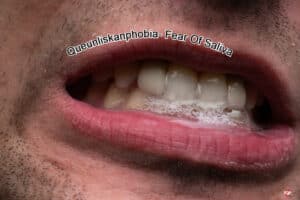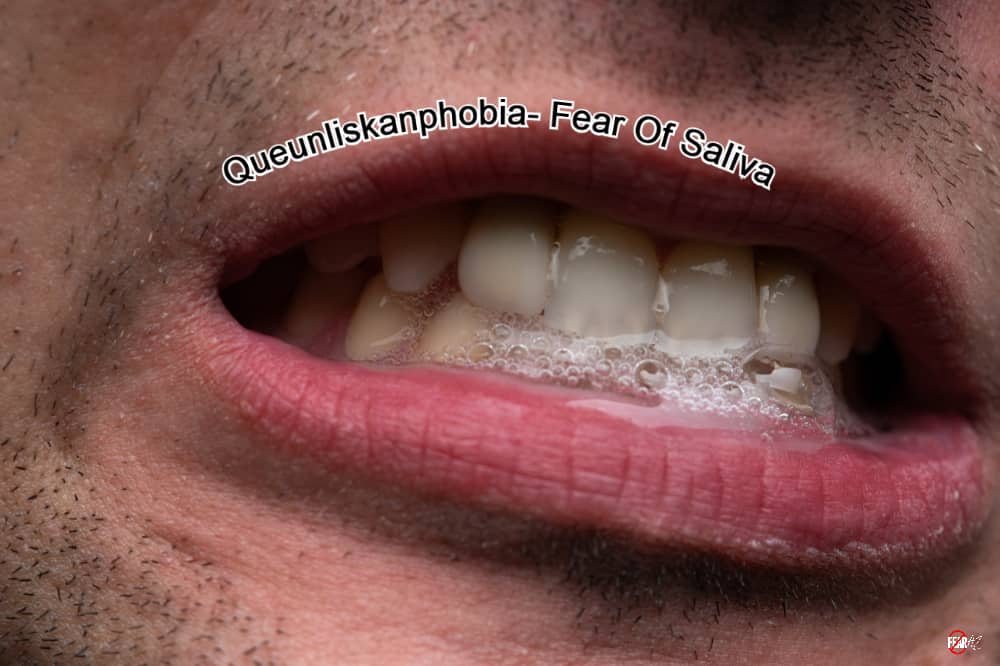Share This Article
Queunliskanphobia – Fear or Disgust?
Does the prospect of kissing send shivers down your spine? Do you refuse to drink from someone’s cup or eat off someone else’s utensils? What about licking an envelope?
If you often find yourself freaked out at the thought of saliva or spit, you may be suffering from queunliskanphobia, or the fear of saliva.
Explaining why you avoid kissing or why you refuse to share a straw or drink from a glass that someone has sipped from can be awkward. However, you’re not alone. There are many who suffer from different kinds of phobias, including queuenliskanphobia. Luckily, there are plenty of resources available to help you overcome it.
Getting treatment for your fear of saliva is possible. With a dedicated approach, you can leave your phobia of saliva behind and live a happy life.
What Is Queunliskanphobia?
Queunliskanphobia is the fear of spit. It is considered a disgust phobia where the sufferer is disgusted by the concept of saliva. It could also be a contamination obsession that is often seen in patients with obsessive-compulsive disorder (OCD).
If this phobia is a result of contamination OCD, the person becomes worried or fearful of becoming contaminated or contracting disease through saliva. Many not only fear saliva but also other bodily fluids.
Some worry that they could become the vector in the spread of an illness. It can cause a need to control the situation and protect themselves and others from getting infected.
Queunliskanphobia can be debilitating, because it may cause avoidance of intimate contact. Not only can it impact romantic relationships, but it can also affect social life. Some with queunliskanphobia may worry about their food or drink becoming contaminated by someone else touching their food or utensils.
Additionally, if you’re wondering Why do I choke on my own saliva?, it may also be due to the phobia of saliva. Many sufferers of queunliskanphobia fear not only others’ saliva but also their own. Many in this situation avoid swallowing their own saliva. And in cases when they do not have an option but to swallow, it is natural that they may experience a choking sensation.

Symptoms of Queunliskanphobia
The symptoms of queunliskanphobia can vary in intensity depending on the severity of the phobia. Take a look at some common physical and mental/emotional symptoms of the fear of saliva.
Physical Symptoms
- Nausea
- Vomiting
- Light-headedness
- Rapid breathing
- Dizziness
- Heart palpitations
- Cold sweats
- Excessive washing or sanitizing
- Avoid talking to people
- Carrying their own cutlery
- Wearing a face mask all the time
Mental/Emotional Symptoms
- Detachment from reality
- Anxiety
- Panic attacks
- Fear of getting contaminated
- Fear of getting sick or dirty
- Anger and irritability
- Strong urge to control things
Causes of Queunliskanphobia
It’s difficult to pinpoint the exact cause of any phobia, including queunliskanphobia. However, there are several theories as to what could lead to a person developing a phobia of saliva.
Environmental Factors
Sometimes a past experience can be enough to set the wheels in motion. Someone who shared a meal with another and later got sick could connect the two incidents and conclude that the reason for their sickness was the person they shared a meal with.
Genetic Factors
One’s predisposition to mental illness has a major influence on the development of any phobia. If you already suffer from depression, anxiety, or panic disorder, it increases the risk of developing other anxiety-related disorders such as phobias.
For those who are genetically prone to mental disorders, someone narrating the incident of how they got sick after sharing a spoon or utensil with someone else may be enough to trigger a fear of saliva.
A person may even have an acquaintance suffering from the phobia of saliva, which can expose them to learning about and witnessing the symptoms of this fear and later developing it themselves.
Treatment of Queunliskanphobia
Just as there is no definitive cause for queunliskanphobia, there is no definitive treatment either. However, as the phobia of saliva is an anxiety phobia, the treatment methods used for other anxiety phobias work for queunliskanphobia as well.
Self-Help
Self-help is one of the most effective approaches for dealing with any phobia. A phobia is an irrational fear, and once the sufferer recognizes that, they can move on to practicing various techniques that can help them deal with it.
There are several things you can do to overcome a phobia of saliva. You could start journaling, which is a great way of understanding your thoughts and symptoms. Journaling also allows you to revisit the entries and examine them for rational or irrational thought patterns.
Here are some relaxation techniques that are also known to be effective at easing the symptoms of a phobia:
- Yoga
- Meditation
- Exercise
- Deep breathing
- Rhythmic breathing
- Counting numbers
Professional Help
There’s no denying the contribution of professional help in the diagnosis and recovery of any mental illness, such as queunliskanphobia. Mental health professionals deal with phobias on a daily basis and have the knowledge and experience needed. They are your best resource for determining the most effective treatment according to your symptoms and the severity of the phobia.
The most common therapies utilized for the treatment of the fear of saliva are:
- Talking therapies
- Cognitive behavioral therapy
- Exposure therapy
- Medication
Learning to Cope with Queunliskanphobia
Living with any phobia is difficult. For someone with queunliskanphobia it can be even harder, because it’s often combined with OCD. One suffering from the fear of saliva tends to stay away from others for fear of coming into contact with saliva or getting saliva on their belongings.
The phobia of saliva can restrict a person to their home and significantly affect their social and personal relationships. That’s why it’s important to speak out and seek help.
Apart from your family and friends, you can also join one of the many online and in-person support groups for those dealing with phobias. It can help you to connect with people who are in the same boat and can better understand your thoughts and fears.
Conclusion
The fear of saliva is not something to be taken lightly. If you suspect you are suffering from queunliskanphobia, seek help from a mental health professional. You can also boost your treatment with self-help methods. With time, patience, and a strong will, you can learn to deal with this phobia and possibly even overcome it.



